DFI CFX3200-DR: ATI RD580 Tweak Attack
by Wesley Fink on May 8, 2006 12:05 AM EST- Posted in
- Motherboards
General Performance
With the Memory Controller on the Athlon 64 Processor, Winstones benchmarks are no longer very revealing of motherboard performance. With the same CPU (and the same memory controller on that CPU), Winstones scores - both Business and Multimedia Content Creation - are tightly clustered. The only deviation from that is that boards that are tweaked for best gaming performance are often near the bottom of a tight range of benchmark performance numbers. The Winstones tests themselves are rapidly becoming dated, and are no longer supported by PC Magazine. While Winstones are still useful in providing real world performance data we will soon be dropping them from our motherboard test suite.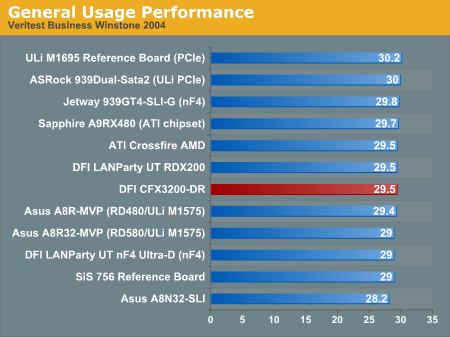
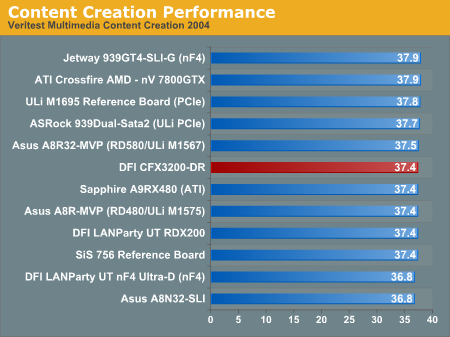

PCMark 2005 results with the DFI CFX3200 were average. Performance of the CFX3200 was in the middle of a tightly clustered group that only ranged from 4464 to 4511. Since all tested boards use ATI chipsets running X1900XT video the performance clustering is expected.
Despite the close results in these tests, PCMark05 is proving to be a useful overall performance benchmark. It is generally more sensitive than the older Winstones and PCMark04 to recent improvements in PC architecture. PCMark05 results in general relate well to the other performance results we find in our board tests, providing a quick and reliable snapshot of board performance compared to other motherboards.
3D Graphics & Encoding
The 3DMark benchmarks, published by Futuremark, are probably the most widely quoted gaming performance benchmarks available. While the benchmarks are based on game sequences written by Futuremark to reveal subtle differences in gaming performance, they still have to be considered synthetic benchmarks. They are useful for broad graphics comparisons, but they are no substitute for benchmarks with real gaming engines that are currently being played.SLI and CrossFire are also generally supported in 3DMarks, so tests were run with both single and dual video cards on all five tested boards. 3DMark06 was recently introduced and you can find more in-depth information about this new 3DMark at in the AnandTech article Futuremark's Latest Attempt: 3DMark06 Tested.
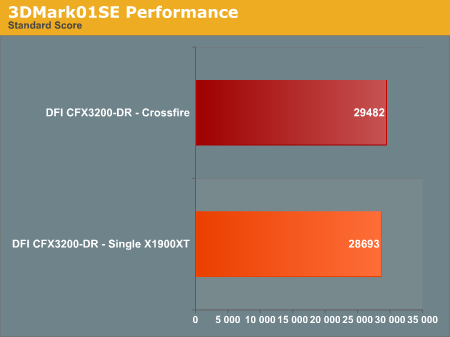
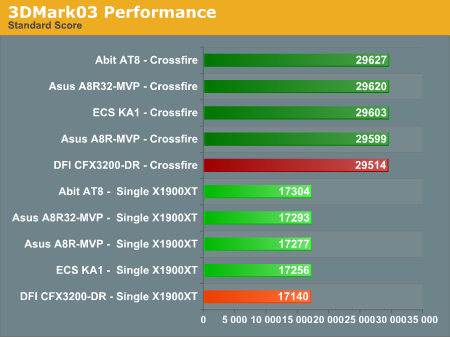

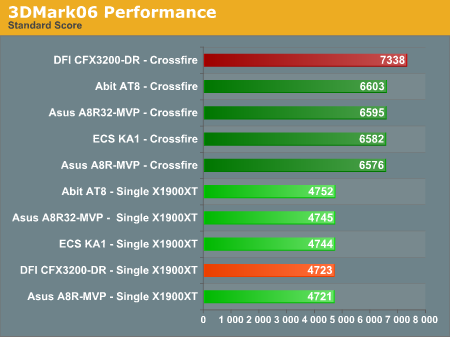
The CFX3200 holds a wide performance lead in CrossFire on 3DMark06 compared to other Rx480 and RD580 motherboards running X1900XT CrossFire. The DFI board does not hold a similar advantage in 3DMark06 when tested with a single X1900XT. 3DMark03 really gains huge performance increases with CrossFire, but results with the DFI are similar to other ATI chipset motherboards in both single and CrossFire modes. The same can be said for 3DMark05, except that CrossFire gains are in the neighborhood of 20% compared to the 70%+ CrossFire gains in 3DM03.
The 03, 05, and 06 are all based on DirectX 9, where 3DMark2001SE is based on DX8. While 3DMark01SE is somewhat dated in DX support it is still widely used by enthusiasts because it is more sensitive to increases in memory bandwidth and CPU speed than later 3DMarks. You can also see that the CrossFire gains in 01SE are very small compared to the DX9 based 3DMarks..
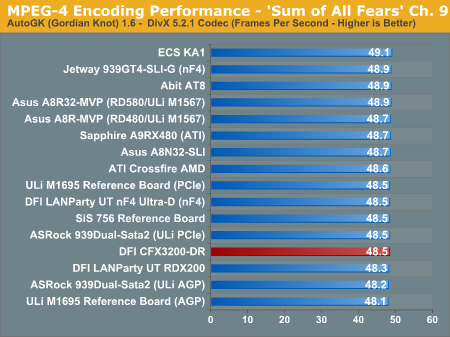
Encoding results should not be affected by the graphics card used during the encoding benchmarks. This is demonstrated again by the archive test results for AutoGK using an AMD 4000+ processor with a wide assortment of video cards. The performance range of those encoding tests is just 48.1 to 49.1 - a difference form high to low of just 1.0 FPS. Clearly the biggest influence on this encoding benchmark is the CPU used for testing. Because encoding test results vary so little on the same standardized motherboard test platform, they will be dropped from future motherboard reviews. Encoding tests are useful in CPU testing, but they have been shown to be poor motherboard tests - particularly on the AMD platform with the memory controller on the CPU.










25 Comments
View All Comments
rqle - Monday, May 8, 2006 - link
"...breathlessly waiting for DFI's AM2 and Conroe motherboards."Great board, but not sure where this new mainboard will fit in since AM2 is coming, many can opt for the nforce expert if they need a board before AM2.
hoping AM2 version is in the works and will be release soon as well.
electronox - Monday, May 8, 2006 - link
*sigh*as far as gaming benchmarks go, what we really need to learn to do is to focus on the lowest framerates rather than the highest framerates (or even the average framerate). fink, anand, and co., you guys offer a progressive tech-journalism and no doubt have thought about what FPS performance really means.
in its most important application, FPS performance means the ability to convey a smooth, fluid visual experience without noticeable dips or jerks in motion. sadly, with the way things are marketed now, the overall fluidity of gaming is sacrificed to reach those peak framerates we all obsess about in our benchmarking suites.
as a long time gamer and enthusiast-sector consumer, i wish such high profile websites as yours would pay more attention to the worst parts of FPS gaming - the parts of the game where the intensity of in-game content is notched up, but often our video settings must be turned down in order to prevent epileptic siezures. such media attention might, in turn, lead industry developers to optimize their drivers for this exceedingly common problem which, in my opinon, is just as easily quantifiable and ever bit as important as average FPS performance.
my thoughts, electronox.
Dfere - Monday, May 8, 2006 - link
I have to agree. I make good money, but I no longer have the time to play with bleeding edge components and do modding. I know this is an enthusiast site, but at least for me , and I think a large amount of readers, an analysis of the max you might get out of a bleeding edge system is not all the value your site brings. A lot of posts by the readers show they have mid range systems. Thus I can only agree that an analysis of the FPS "issues" described above with a mid range system would help readers identify what would best go with their current system, not just a top of the line upgrade. I know your testing tries to determine , for example, CPU limits or GPU limits...... but it really only does so on bleeding edge systems..... and these comments were already mirrored in the latest AGP vid card releases......(why compare a new AGP card with new processor when most AGP owners have 754 systems.... etc)JarredWalton - Monday, May 8, 2006 - link
I think it all depends on what game you're talking about, and how the impact is felt in the fluidity of the FPS score. These days, the vast majority of first-person shooters have a pretty consistent FPS, at least in normal gaming. In benchmarks, you're often stressing the games in a somewhat unrealistic sense -- playing back a demo at three or four times the speed at which it was recorded. Why does that matter? Well, depending on the game engine, loading of data can occur in the background without actually slowing performance down much, if at all. In a time demo, you don't generally get that capability, since everything moves much faster.There are several other difficulties with providing minimum frame rates. Many games don't report instantaneous frames per second and only provide you with the average score. (Doom 3, Quake 4, Call of Duty 2, Half-Life 2, Day of Defeat: Source all generate scores automatically, but don't provide minimum and maximum frame rates.) If we notice inconsistent frame rates, we do generally comment on the fact. About the only game where I still notice inconsistent frame rates is Battlefield 2 with only 1GB of RAM -- at least on a system of this performance level. (I suppose I should throw in Oblivion as well.)
Sure, we could use tools like FRAPS together more detailed information, but given that there's a limited amount of time to get reviews done, would you rather have fewer games with more detailed stats, or more games with average frame rates? Realistically, we can't do both on every single article. Our motherboard reviews try to stay consistent within motherboards, our processor reviews do the same within CPU articles, and the same goes with graphics cards and other areas. If we have an article where we look at results from one specific game, we will often use that to establish a baseline metric for performance, and readers that are interested in knowing more about the benchmark can refer back to that game article.
Average frame rates are not the be-all, end-all of performance. However, neither are they useless or meaningless. we run into similar problems if we report minimum frame rates -- did the minimum frame rate occur once, twice, frequently? As long as people understand that average frame rates are an abstraction representing several layers of performance, than they can glean meaning from the results. You almost never get higher average frame rates with lower minimum frame rates, or conversely lower average frame rates with higher minimum frame rates -- not in a single game. In the vast majority of benchmarks, an increase in average frame rate of 10 FPS usually means that minimum frame rates have gone up as well -- maybe not 10 FPS, but probably 7 or 8 FPS at least.
In the end, without turning every article into a treatise on statistics, not to mention drastically increasing the complexity of our graphs, it's generally better to stick with average frame rates. Individual articles may look at minimum and maximum frame rates as well, but doing that for every single article that uses a benchmark rapidly consumes all of our time. Are we being lazy, or merely efficient? I'd like to think it's the latter. :-)
Regards,
Jarred Walton
Hardware Editor
AnandTech.com
OvErHeAtInG - Monday, May 8, 2006 - link
Good answer :) Also I think that minimum framerates (while very important in gameplay) are much more impacted by the videocard used. With a motherboard review, we're much more concerned with overall performance, which is exactly what you gave us with the avg. framerate numbers...